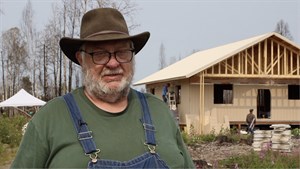ACEP Collaborates on McKinley Fire Video
ACEP partnered on a new video that details the impacts and aftermath of 2019’s McKinley Fire.
“The McKinley Fire: Rebuilding and Lessons Learned” is a joint production of ACEP, the UAA Institute of Social Economic Research, and Alaska NSF EPSCoR (National Science Foundation Established Program to Stimulate Competitive Research). The video is part of EPSCoR’s Fire & Ice project, a five-year study of climate-driven changes to Alaska’s coastal margins and boreal wildfires.
“The McKinley wildfire was included in Fire & Ice because it was a recent wildfire that affected residents of Alaska,” says Jennifer Schmidt, a Fire & Ice researcher who has been studying the McKinley Fire. “Given that it was a recent fire, we could learn about the immediate effects of wildfire on the environment and residents.”
The McKinley Fire began on Aug. 17, 2019, and burned south along a 10-mile stretch of the Parks Highway north of Willow. The fast-moving blaze was one of the most destructive of Alaska’s many 2019 wildfires, destroying 52 primary residences, three commercial structures and 84 outbuildings.
Schmidt’s research is part of a Fire & Ice focus on the economic impacts of fires in Southcentral Alaska. Schmidt and other researchers are examining both positive and negative impacts of fires, and how property owners balance wildfire risks with the costs of prevention.
In addition to describing the fire and its impacts, the video also includes information about ways homeowners can mitigate wildfire risk using Firewise program steps such as clearing a defensible zone around the home. The Anchorage Fire Department plans to incorporate it into its 2021 wildfire education program.
Schmidt said the video is in keeping with an increased emphasis on doing science that benefits society and provides useful tools. “Based on my discussions with Anchorage residents and municipality employees, I knew that wildfire is a concern, and efforts to promote increased resilience towards wildfire were welcomed,” she said. “The world is a busy place and people are stretched thin, but together we can make a difference.”
The video centers on interviews with residents of the fire area and with fire professionals. Schmidt conducted the interviews. ACEP’s Amanda Byrd, with EPSCoR’s Naomi Hutchquist, filmed and edited them. Additional footage was provided by the Alaska Division of Forestry, and both Hutchquist and EPSCoR’s Cassidy Phillips created animations for the video.
“Helping to tell the very personal and often devastating stories of wildfire effects on a community was a unique and humbling experience,” said Byrd, ACEP’s chief storyteller. “Having the video be used to educate homeowners on how to protect their homes and property from future wildfire risk is wonderfully rewarding.”
For more information on this video contact Amanda Byrd at agbyrd@alaska.edu.
Ned Sparks lost his home during the 2019 McKinley Fire. Volunteers are building a new home for him and his family. Image by Amanda Byrd.



